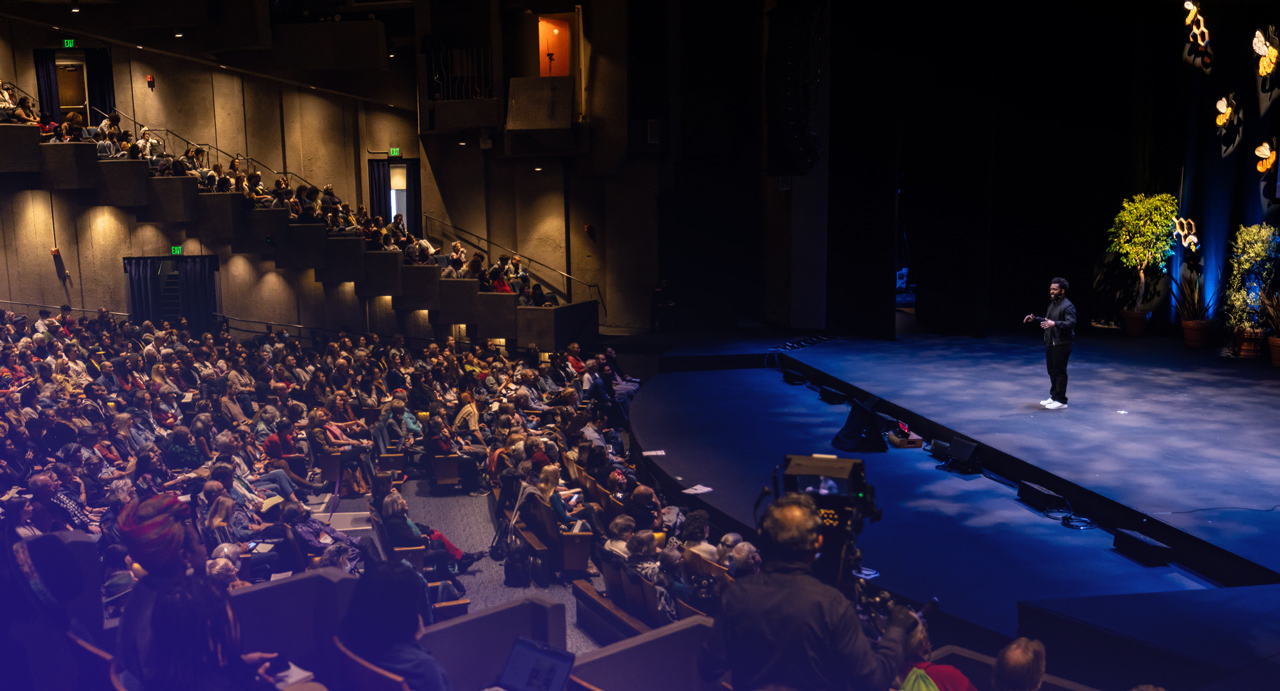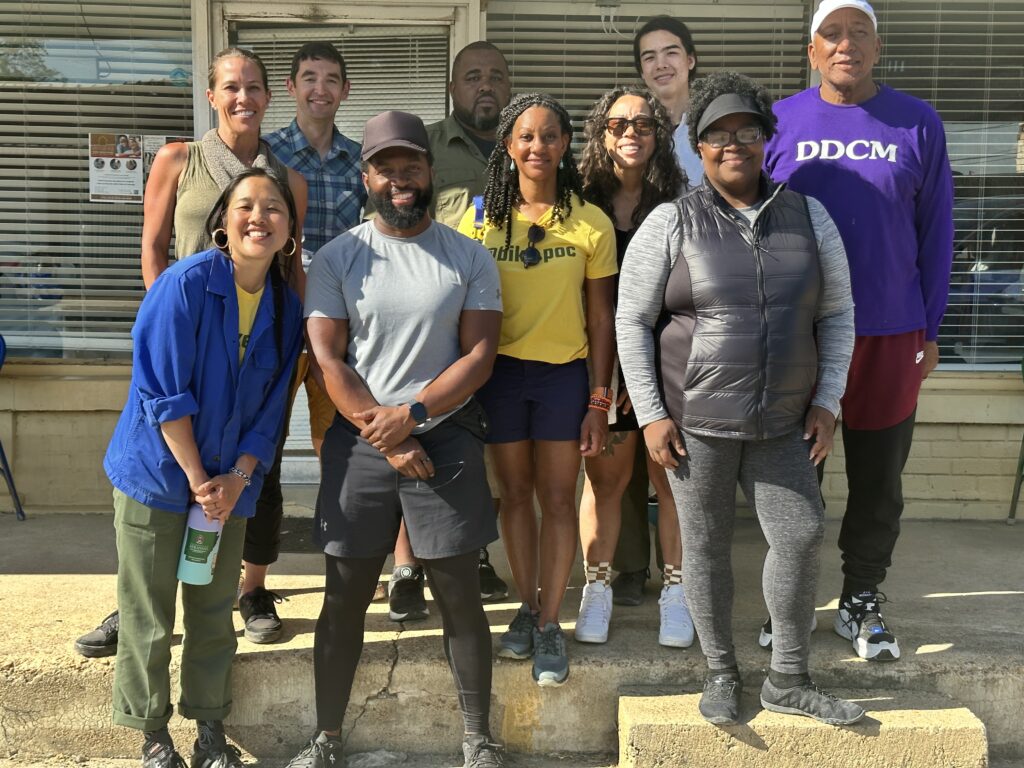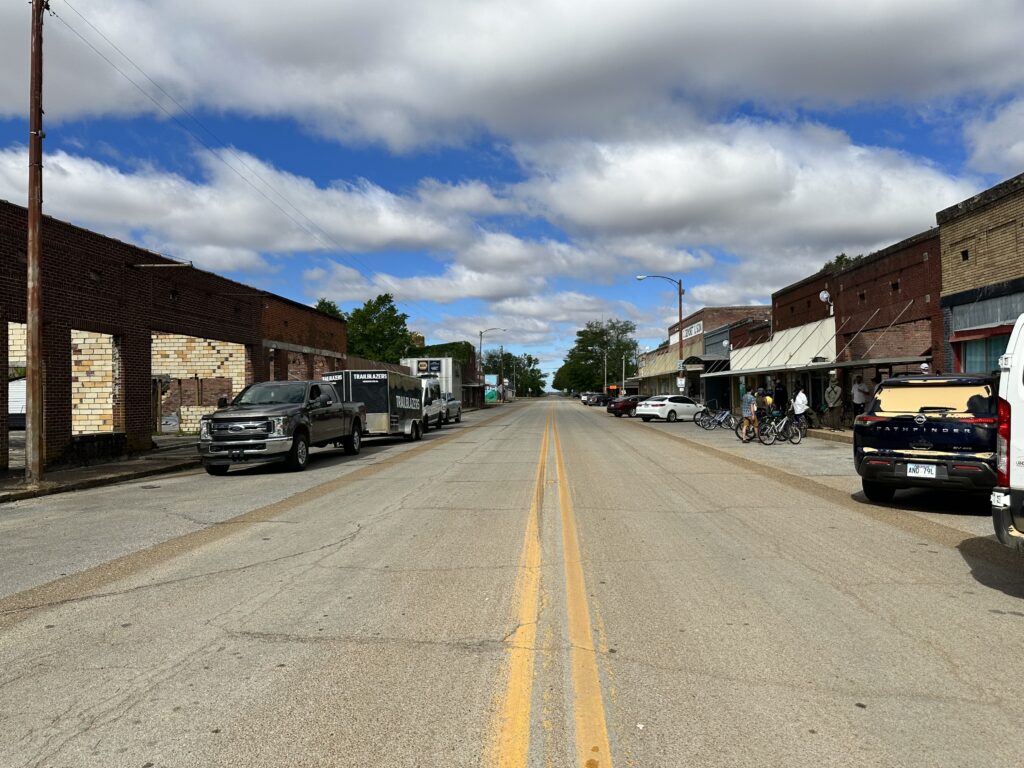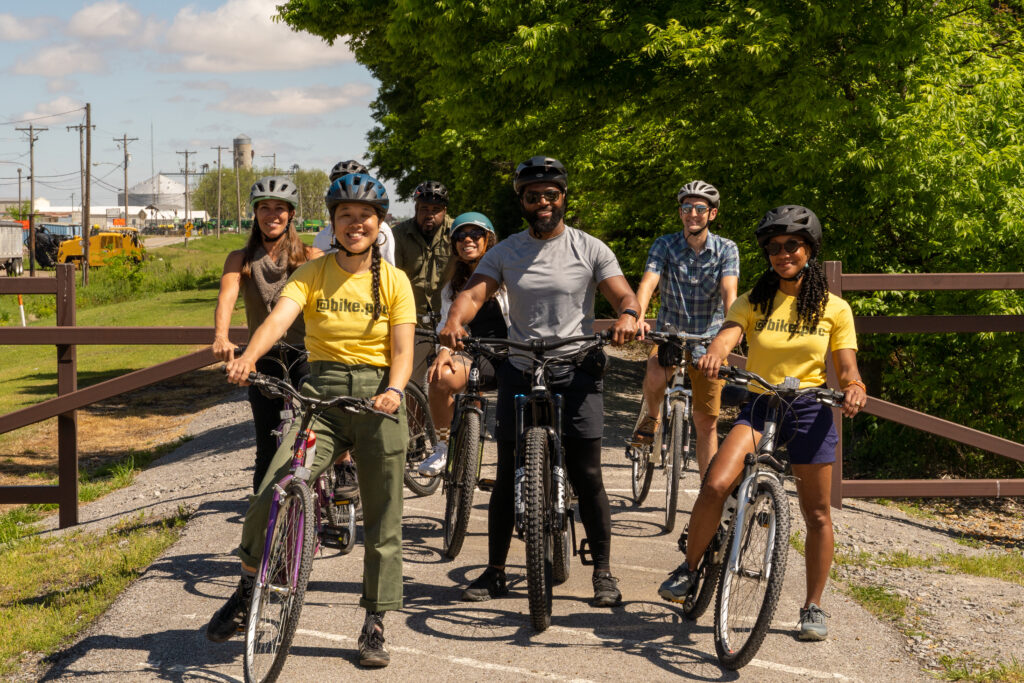Declarations of Interdependence: A Story of Storytelling
Bioneers | Published: May 13, 2025 JusticeNature, Culture and Spirit Podcasts
Since time immemorial, storytellers have held an exalted role in human societies, because stories illustrate parables that help us make sense of the world and survive. In this episode, we hitch a ride with comedian, writer, futurist, technologist, and storyteller Baratunde Thurston. At this perilous existential threshold that will determine the fate of the human experiment, he knows that the story of the battle is equally the battle of the story.
Featuring
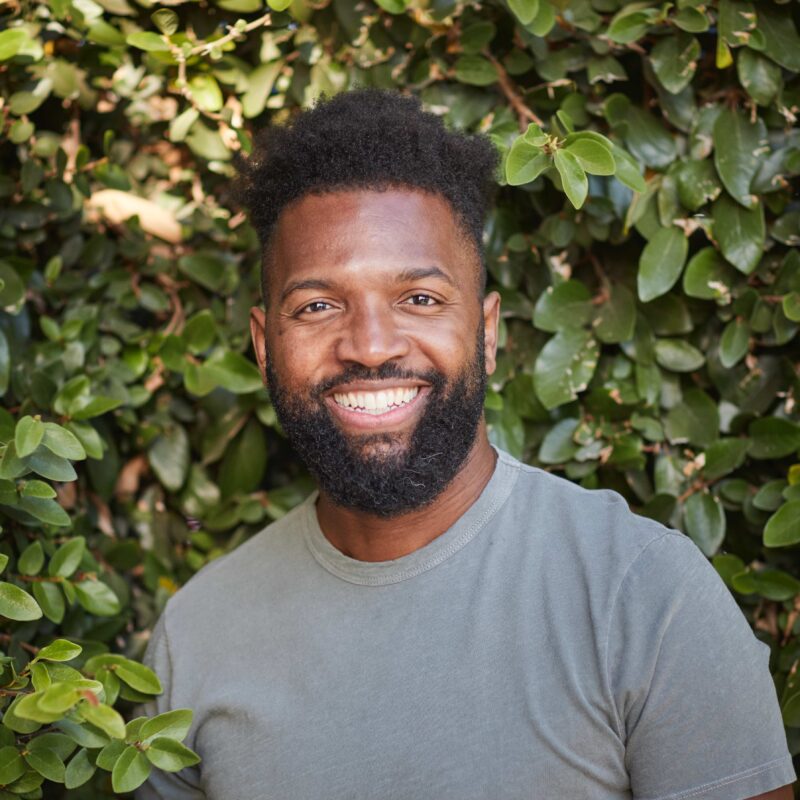
Baratunde Thurston, a writer, communicator, and creator and host of the How To Citizen podcast, is also a founding partner and writer at Puck. His newest creation is Life With Machines, a YouTube podcast focusing on the human side of the A.I. revolution. Author of the bestselling comedic memoir, How To Be Black, Baratunde also serves on the boards of Civics Unplugged and the Brooklyn Public Library and lives in Southern California.
Credits
- Executive Producer: Kenny Ausubel
- Written by: Kenny Ausubel
- Senior Producer and Station Relations: Stephanie Welch
- Associate Producer: Emily Harris
- Producer: Teo Grossman
- Host and Consulting Producer: Neil Harvey
Resources
Baratunde Thurston – From Me to We, A Story of Interdependence | Bioneers 2025 Keynote
This is an episode of the Bioneers: Revolution from the Heart of Nature series. Visit the radio and podcast homepage to find out how to hear the program on your local station and how to subscribe to the podcast.
Subscribe to the Bioneers: Revolution from The Heart of Nature podcast
Transcript
Neil Harvey (Host): We hitch a ride with the comedian, writer, futurist, technologist and storyteller Baratunde Thurston.
Like so many stories, his story began with a journey. But in this case, the journey was storytelling.
As human beings, our brains are hard-wired for stories and metaphor. At this perilous existential threshold that will determine the fate of the human experiment, Baratunde knows that the story of the battle is equally the battle of the story…
I’m Neil Harvey. This is “Declarations of Interdependence: A Story of Storytelling”.
Baratunde Thurston (BT): I want to tell you a story, because that’s what I do. I try to weave stories of interdependence through our relationships with Earth, with each other, and with technology. And that’s important now more than ever because we are in a crisis. In fact, it’s so big, people are calling it a poly-crisis. This is a crisis that can’t commit to just being one crisis. [LAUGHTER] It’s a crisis in an open relationship. You’ve got a democracy crisis entangled with a climate crisis, entangled with an economic crisis and a technology crisis. And there is another crisis, and that is the overuse of the word crisis. [LAUGHTER] It’s a serious crisis, and I’m proud to be brave enough to name it. You’re welcome.
Host: As a storyteller, Baratunde Thurston has been nominated for an Emmy and has worked for the Daily Show. He’s the host and executive producer of the PBS TV series America Outdoors.
As a podcaster, he’s the co-creator and host of How To Citizen and Life With Machines.
His comedic memoir, How To Be Black, was a New York Times best-seller. He first developed his stand-up comedy shortly after graduating from Harvard.
Since time immemorial, storytellers have held an exalted role in human societies because stories illustrate parables that both make sense of the world and help us survive.
As the writer Ferris Jabr wrote in The Story of Storytelling, “In many ways, stories are uncannily similar to living organisms… They were simulations that allowed our ancestors to develop crucial mental and social skills and to practice overcoming conflict without being in actual danger. A story is really a way of thinking – perhaps the most powerful and versatile skill in the human cognitive repertoire.”
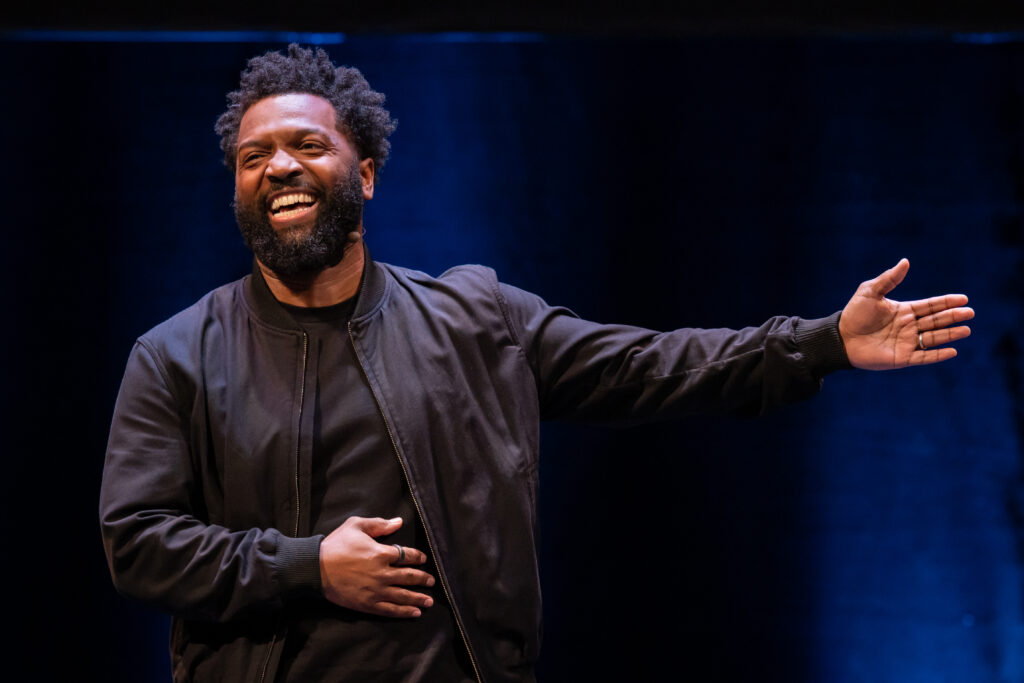
BT: My name is Baratunde Rafiq Thurston. [CHEERS] When we speak our names, we speak our ancestors who spoke us into being when they named us. I was born and raised in Washington, D.C. I am the son of Arnold and Arnita, who were both born and raised in Washington, D.C. My mother, the daughter of Homer and Lorraine, who were both born and raised in…[AUDIENCE RESPONDS] Washington, D.C. My father, the son of Leon and Dora, who were both born and raised in…[AUDIENCE RESPONDS] Orangeburg, South Carolina. [LAUGHTER] And so we’ve arrived at our first lesson, about the limitations of autocomplete and pattern recognition as a substitution for intelligence. Some of the best patterns are the ones we intentionally break.
My mother was a powerful force of nature, born into a story too small to contain her full nature– her spirit. Born in 1940 in these United States, born to a family that told her she was too Black and too dumb to amount to anything, into a nation that didn’t have space for a woman or a Black person as big as she was. But she found a way toward liberation through a more expanded story through her relations with her own grandparents who loved nature and the outdoors. And she would spend a good time with them out on the land. She found herself in a community of Pan-Africanist radical people trying to reform a sense of self and identity, to love themselves. She found herself as a computer programmer in the early 1980s for the federal government.
When you have a mother like this, that well of beautiful, pure water, it flows right down into me. My mom put me in this Boy Scout troop, all Black Boy Scout troop, put me in a rights of passage program run by these West African-inspired Afrocentric people. Basically I was in a Wakanda sleeper cell. And I am not even joking, y’all. [LAUGHTER] We’ve got a meeting later today. You know who you are.
She would take me on these camping trips and biking trips and fishing trips with my little friends. She would take me to community meetings and political rallies and cultural events so I could feel who we are as people together. She would liberate excess inventory of technology from her job, [LAUGHTER] and bring a computer home so me and my older sister, Belinda, had a taste of the future before most people even knew. And when she sent me to private school, she gave me this bumper sticker. It said: Question authority. She said, “You should put this in your locker.” And I did so without question. [LAUGHTER] Now you know something about her and something about me.
One of the greatest gifts my mother gave me was to plant a seed in the form of a question. She gave me an extra homework assignment. I was no more than 12 years old when she said to me, “I want you,” and by extension my older sister, Belinda, “I want you to come up with a system we will live under after democracy and capitalism have failed.” [APPLAUSE] What? I had just started sweating from my armpits at that age. I got nervous feelings in my chest when girls were too close. I was not prepared for this homework assignment. So I set it aside, thinking I had discarded it, only to discover later it was a seed planted in my own journey through life to find bigger stories of who we can be, would water that seed, and it would start to sprout so beautifully.
Host: That seed unfolded into a story of storytelling. Again, Baratunde Thurston…
BT: There are three narrative universes I want to take you through that have shown me what we already know, that we got this, because we always have.
In 2020, my wife Elizabeth and I started a podcast—You may have heard I like those—called “How to Citizen.” Citizen is a verb. We have a valuable use for it as a noun, but that is a separating function. The verb is an invitation to function, to practice. And we started this journey, and we uncovered—it was revealed to us, I will say – four principles of what citizen as a verb practically means, four things.
Number one: Show up and participate. Assume there’s something for you to do.
Number two: Understand power, just the ability to get somebody to do what you want them to. It could be physical, financial, gathering, ideas. It could be attention. Where you give your attention, you give your power. Right now, I’m the most powerful being in this room. [LAUGHTER] But my own power is also what I choose to do with it.
Number three: To citizen is to commit to the collective, not just the individual self, which is made easier when we conceive of ourselves as more than just ourselves, where we take the advice of our very first guest, Valarie Kaur, who wrote the seminal book See No Stranger. A stranger is just a part of myself I do not yet know. We can still be selfish so long as we expand the self.
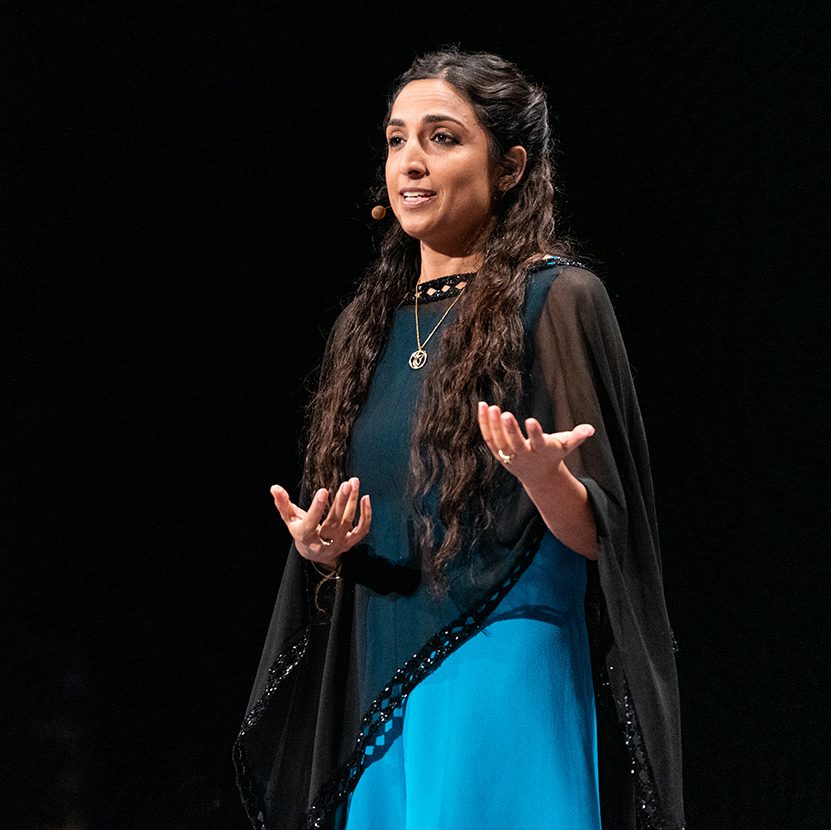
Laboring For Justice: See No Stranger
In this podcast episode, award-winning scholar and educator Valarie Kaur says to overcome racism and nationalism, we must not succumb to rage and grief. As someone who has spent much of her life challenging horrific injustices and intolerance, Kaur learned the lesson that historical nonviolent change-makers understood: social movements must be grounded in an ethic of love. Listen now.
Which leads to the fourth principle: To citizen is to invest in relationships with yourself, with others, and with the planet around you. Because we’ve been lied to, told we are separate from all these things. We’re just one thing.
So we found beautiful stories exemplifying this, because I was tired of the story that said we’re just divided, we’re just dysfunctional, we can’t get anything done, and that is not the world from which I come.
Host: That theme of interdependence began to take center stage in Baratunde’s work. After all, what you appreciate appreciates, and stories can quickly take on a life of their own…
BT: So we talked to people you may have heard of, like José Andrés, the surface story is, oh, José Andrés is out here, running around the world, feeding people after disasters. No. He is out here and his team is out here with a process that unlocks the local foods and the local cooking capacities, from the food truck operators and the restaurateurs, and the mamas and the aunties who feed themselves. That’s the story. [APPLAUSE]
We heard the story of the East Bay Permanent Real Estate Cooperative right around here. Shout out to the East Bay. Creating their own housing for the businesses that they choose, meeting their own needs.
We heard the story of a radical politics without politicians. That sounds tasty. An ancient tradition, it turns out, of citizen assemblies. Spoke with Claudia Chwalisz from DemocracyNext who reminded us of this old school way of conscripting people into public service. That’s the most representative system there is, a random allotment and sortition of everyone there? Not just the folks who raise their hand, the extroverts who like to see themselves on stage? There is wisdom in every crowd.
We met fellow travelers along the way, the Adrienne Maree Browns. Jon Alexander was a fellow traveler we met, all the way, ironically, from England, helping us citizen here in America. Has a beautiful book, Citizens, and a framework for the stories that we are moving through: a subject story, where a single source tells you what to do; a consumer story, where we get to choose from choices that we didn’t choose, to transact our way into community is a dead end; the citizen story, where the answer lies within the worlds within all of us, taking on challenges so big, no one entity or person or party could solve it.
So I felt really good about the How to Citizen thing. I was like we solved the democracy thing but America kept America-ing. So I went outside. I got invited to host America Outdoors with PBS. And y’all, I got to see America and Amurica. [LAUGHTER] And they’re both beautiful. I got to spend time with people connected to this land, literal common ground under our alleged divisions.
I went to a town called Elaine in Arkansas, site of one of the most violent and deadly racist massacres in U.S. history that most of us had never heard of. But I went there with a multi-racial bicycling group called BikePOC. [LAUGHTER] Get it?
It’s in the name. The railroad tracks that had brought such devastating and violent destruction at the end of a Gatling gun mowing down farmers and their wives and their children for standing up for their rights. Those tracks had been converted to a bike path, and we rolled deep in our multi-racial joy, healing ourselves and the land in the process. We met the very first Black mayor of this town ever, who’s changing that story.
What do we do with the histories we inherit that don’t feel good? We can metabolize them. We can. [SIGHS]
Host: When we return… Baratunde Thurston’s storytelling journey takes him across the great divide through the country’s heartlands. Along the way, he discovered the ancient Native American roots of American democracy that flourished a thousand years before the first Europeans arrived.
You’re listening to the Bioneers: Revolution from the Heart of Nature.
Host: As Baratunde Thurston criss-crossed the country hunting and gathering the American story, he experienced the post-modern ground truth of the poly-crisis.
BT: I spent time on the South Fork of the Salmon River with Shoshone Bannock people, the Salmon People. We showed up to do a salmon hunt, but the salmon decided not to show up. Because we had turned the temperature up on their home. We’re cooking them in their very home, and the spirit that we felt from the people when we arrived was of mourning, the loss of their siblings who had provided so much throughout their history.
I felt this feeling mirrored in one of the most conservative places I ever visited—Tangier Island, Chesapeake Bay, where the mayor of that town nearly broke down in tears because he had to exhume his own ancestors and move them to higher ground because that island is about to disappear due to rising sea levels.
United in a story of grief and kinship across alleged divides, I felt this common lesson, this beautiful privilege to engage with the nations within our nation. We did a story about Death Valley, which is really Timbisha. It’s called Death Valley because some white folks back in the day didn’t pack right. [LAUGHTER] They should have called it We Didn’t Prepare Valley. We Misunderstood the Assignment Valley. [LAUGHTER]
Everywhere I went, from explicitly and implicitly Indigenous people, I kept hearing the same refrain. Dudley Edmondson said it so well: We are not apart from nature, we are a part of nature. I felt my own kinship with trees, trees that had been weaponized against people like me, conscripted into violence through the series of lynchings. We never think about what we’ve done to them as well; to recognize that a tree is more than just timber to be mined, a product to sell. But our lungs, beyond our bodies, helping us breathe, which makes me want to take a big inhale because…ChatGPT?
I remember where I was when that guy dropped on our heads. Do you remember where you were when ChatGPT hit our feeds and our headlines? The odds are you were on the toilet. [LAUGHTER] So, being the podcast fiend that I am, my wife and I were like let’s make another show—Life with Machines, exploring the human side of this AI moment.
We are invoking and creating a new population of synthetic beings when we are out of balance and right relations with our fellow human beings and the Earth beneath our feet. Which presents an opportunity. We could double down on the colonial mindset, on the extraction, on the buy, buy, buy, and the sell, sell, sell. Or we could tell ourselves a different story, of using these technologies to deepen our humanity.
Seneca scholar John Mohawk – he’s been invoked once on this stage already, a long-time advisor to this very community, wrote of liberation technologies, those that free us from multinational corporations, those that are built by, of, and for the people. They’re “fubu” technologies—for us, by us. They come from a local place, solve problems defined by the people themselves. We could do that right now, and I’ve seen hints of it.
We talked to the Earth Species Project, literally using AI to listen in to whales. Whales have a group chat. [LAUGHTER] It’s lit, yo, you have no idea.
The Climate Trace Project using AI to spot climate criminals all over the world, and measure emissions even when people don’t want you to. To shift our energy use to the things that are good for all of us. We could even apply AI to help us connect better to ourselves to upgrade our social technology of so-called democracy and bring it into the fold like those people in Taiwan. Audrey Tang has told the story well. We can have a more fluid, collective intelligence that allows us to see what we have in common, not just what separates us, but we must choose this future.
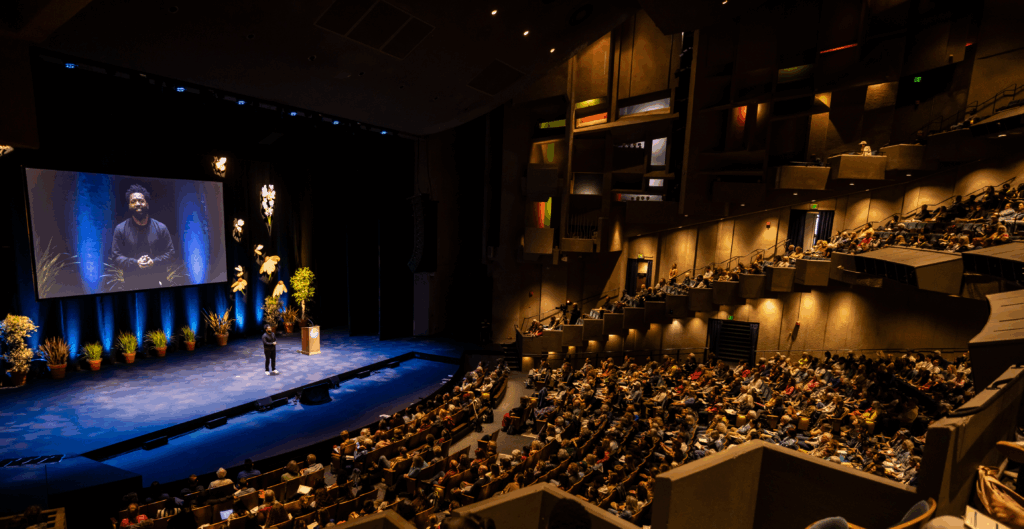
Host: For Baratunde, choosing the future that elevates what we have in common opened windows to the distant past. He fell upon an ancient Native American history of democracy that influenced the founding of the United States. It’s the story behind the story most of us have been taught.
That history of the Haudenosaunee Six Nations Confederacy would become his next podcast-in-progress: Project Interdependence.
BT: Now, I thought the stories were going pretty good, but there was something gnawing at me, a missing piece. As we were winding down the podcast phase of How to Citizen, we knew that there was a story of peace, of democracy right here on this land, heard the echoes of the words Haudenosaunee Confederacy, literally had reached out to a man named Chief Oren Lyons to bring him on the show. Didn’t hear back though. [LAUGHTER] He’s busy. So we moved on.
And then, as my friend C Lai says, sometimes you’ve got to trust the timing. One year ago, almost to this day, a group of us, roughly 12, invited into deep relational community with elders from the Haudenosaunee Confederacy, to sit and exchange, to hear and feel the deep truth that only an oral tradition can communicate. It is the closest thing to time travel, to hear people speak of their time immemorial practices of the preexistence of a confederacy of many nations before this nation was ever born. And the colonists and the settlers found it when they arrived. And they studied and were influenced. Many hands making the soup but some of them were Indigenous hands. Ben Franklin even wrote about it.
They had something figured out that we’re still working on—the equal role for women, the long-term thinking, a seat at the table for nature herself. [CHEERS] This is great news. This is great news, because, look, we’re in this polyamorous crisis situation. [LAUGHTER]
Which is really just a narrative battle. It’s a battle of stories. And we have this story over here that says I, alone, can fix it; this story over here that says we don’t have enough, that we should fear one another, that the only way to exist is on top of someone else, to dominate and extract and destroy in order to exist. That is a lonely path, because you leave aside all your relations and all your allies. The people moving in that story right now are trying to burn it all to the ground.
But here’s what they don’t know. We here, we Earthlings, we people who believe in the full spectrum of life understand the full power of fire to cleanse, to renew, to lay ground for a forest to grow stronger than before. The toxins put off by the systems that are dying are ones that we can compost into something more beautiful. [APPLAUSE] That is our task. They speak of I, we speak of we. They speak of less, we speak of more.
We are already doing it. We’re seeing languages, thought extinct, to be reawakened. I have seen Appalachia rising, former coal miners now turned into beekeepers, changing their violent relationship with a mountain to one of stewardship. I have heard white ranchers sounding like Indigenous people, saying, I don’t own this land. I’m taking care of it for these birds.
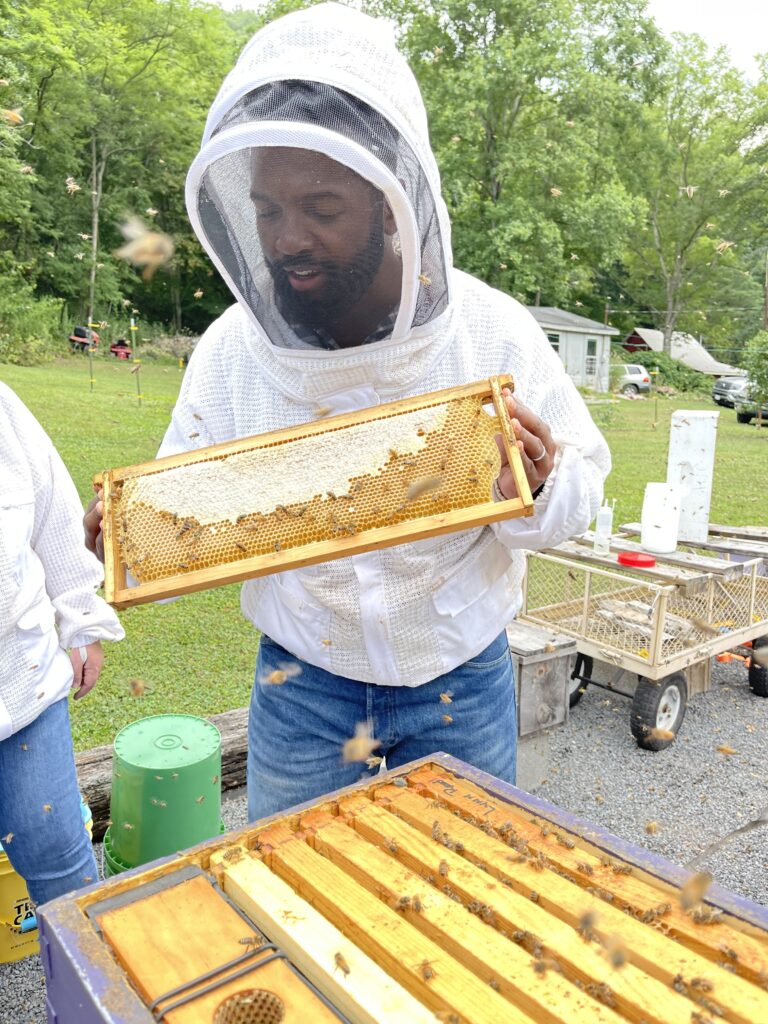
The future we want is already here. The story we need, we’re embedded within. We must tell it again and again and again. That’s how we make things true. That’s how we manifest it into being. That’s the task.
The biggest lie is that there’s such a thing as I that’s separate from you. Quantum physicists will tell you through and through, we’re all just energy, an explosion of the big bang cruising on waves of cosmic energy from then to now that has never lessened or increased. We are each other. We is just me flipped right side up. Let’s get that trending. [LAUGHTER]
Tell the story we already know. Listen to and honor those who’ve been telling it the whole time. Remember, y’all, renew our commitment to belonging. Remember, we’re already doing it. We’ve already won, because we exist across this continuum that’s never started and never stopped. It just is. Thank you. [APPLAUSE]
Host: Baratunde Thurston, “Declarations of Interdependence: A Story of Storytelling”…

